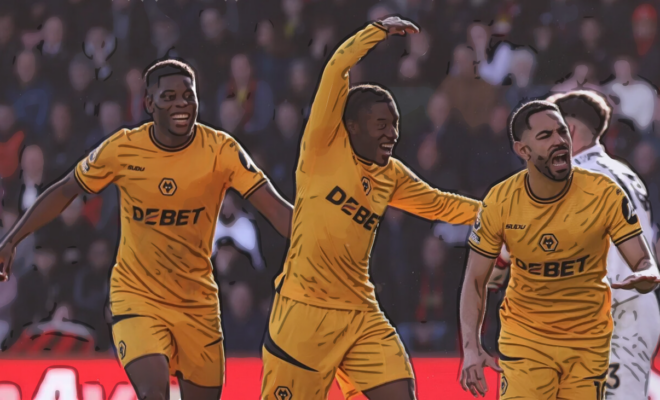The Importance of a Clinical Striker: What the Bournemouth Defeat to Wolves Can Teach Arsenal

In the modern game, where tactical nuances and strategic complexities often dominate the narrative, the age-old adage that “goals win games” remains profoundly relevant. This was starkly illustrated in Bournemouth’s recent defeat to Wolverhampton Wanderers, a match where the Cherries’ inability to convert promising opportunities into tangible rewards proved to be their undoing. For Arsenal, a team aspiring to compete at the highest echelons of the Premier League and beyond, this fixture serves as a potent reminder of the critical importance of a clinical striker – a player capable of seizing the moment and maximizing even the most fleeting of chances.
Bournemouth’s Profligacy: A Case Study in Missed Opportunities
Bournemouth’s match against Wolves unfolded as a tale of dominance undermined by a lack of ruthlessness in the final third. Despite creating a number of presentable chances, Andoni Iraola’s side failed to find the back of the net, ultimately succumbing to a 1-0 defeat courtesy of Matheus Cunha’s decisive strike.
Several factors contributed to Bournemouth’s inability to convert their opportunities:
- Hesitancy in Front of Goal: On multiple occasions, Bournemouth’s attacking players appeared hesitant and indecisive when presented with clear-cut chances, allowing Wolves’ defenders to recover and thwart their efforts.
- Poor Decision-Making: In the heat of the moment, Bournemouth’s attackers often made poor decisions in the final third, opting for low-percentage shots or failing to pick out teammates in better positions.
- Lack of Clinical Finishing: Ultimately, Bournemouth’s downfall stemmed from a lack of clinical finishing – the ability to calmly and accurately convert chances under pressure.
Cunha’s Decisiveness: The Mark of a Clinical Finisher
In stark contrast to Bournemouth’s profligacy, Wolves’ Matheus Cunha demonstrated the qualities of a clinical finisher, seizing upon a loose ball in the penalty area and dispatching a decisive strike past Kepa Arrizabalaga.
Cunha’s goal highlighted several key attributes of a clinical striker:
- Composure: Cunha maintained his composure in a high-pressure situation, calmly assessing his options and picking his spot.
- Accuracy: Cunha demonstrated exceptional accuracy, striking the ball with precision and power to beat the goalkeeper.
- Ruthlessness: Cunha displayed a ruthless streak, seizing upon the opportunity without hesitation and maximizing his chance.
- Positioning: Cunha showed intelligent positioning, finding himself in the right place at the right time to capitalize on the loose ball.
Implications for Arsenal: The Need for a Goal-Scoring Sharpshooter
Arsenal, under Mikel Arteta, have cultivated a reputation for their attractive, possession-based style of play and tactical sophistication. However, like Bournemouth, the Gunners have, at times, struggled to translate their dominance into goals, particularly in tight, high-stakes encounters. The defeat to West Ham illustrates this, and it serves as a reminder of the critical importance of having a clinical striker who can consistently find the back of the net.
Addressing the Goal-Scoring Void: Potential Solutions
To address their goal-scoring shortcomings, Arsenal can explore several potential solutions:
- Improve Existing Players’ Finishing Skills: Arsenal’s coaching staff can work to improve the finishing skills of their current attacking players through targeted training drills and individual coaching sessions.
- Enhance Decision-Making in the Final Third: Arsenal can focus on improving their players’ decision-making in the final third, encouraging them to make smarter choices about when to shoot, pass, or dribble.
- Strategic Player Acquisition: Arsenal could look to acquire a striker with a proven goal-scoring record, either in the January transfer window or during the summer, to provide a consistent source of goals.
Honing Finishing Skills: A Multi-Faceted Approach
Improving the finishing skills of Arsenal’s existing players requires a multi-faceted approach encompassing technical, tactical, and psychological elements:
- Repetitive Drills: Implementing repetitive finishing drills that focus on accuracy, power, and composure in various game-like scenarios.
- Individual Coaching: Providing individualized coaching sessions to address specific weaknesses in each player’s finishing technique.
- Video Analysis: Utilizing video analysis to identify patterns in players’ finishing and provide targeted feedback for improvement.
- Match Simulation: Incorporating match simulation exercises that replicate the pressure and intensity of real game situations.
- Mental Preparation: Training players to develop mental fortitude and maintain composure when presented with scoring opportunities.
Strategic Acquisitions: Identifying the Right Profile
If Arsenal opt to pursue a strategic acquisition, it’s crucial to identify a striker who not only possesses a proven goal-scoring record but also aligns with the team’s tactical philosophy and overall playing style.
Key attributes to consider when evaluating potential striker targets include:
- Goal-Scoring Record: A consistent track record of scoring goals at a high rate in a competitive league.
- Finishing Technique: Excellent finishing technique, with the ability to score goals with both feet and the head.
- Composure Under Pressure: The ability to maintain composure and make sound decisions in high-pressure situations.
- Movement and Positioning: Intelligent movement and positioning, with the ability to find space in the penalty area and anticipate scoring opportunities.
- Work Rate and Team Ethic: A strong work rate and a willingness to contribute to the team’s overall defensive effort.
The Impact on Arsenal’s Aspirations: A Decisive Factor
The acquisition of a clinical striker could prove to be a decisive factor in Arsenal’s pursuit of their ambitious goals. By adding a proven goal-scorer to their ranks, the Gunners can significantly increase their chances of:
- Climbing the Premier League Table: A consistent stream of goals can propel Arsenal up the Premier League table, solidifying their position among the top contenders.
- Qualifying for the Champions League: A clinical striker can provide the firepower needed to secure a coveted Champions League spot.
- Competing for Silverware: A proven goal-scorer can be the difference between winning and losing in crucial cup competitions.
The Road Ahead: Arsenal’s Pursuit of Goal-Scoring Prowess
Bournemouth’s defeat to Wolves serves as a stark reminder of the importance of a clinical striker – a player capable of seizing the moment and maximizing even the most fleeting of chances. For Arsenal, addressing their goal-scoring shortcomings is paramount to their aspirations of competing at the highest level. By improving their existing players’ finishing skills, enhancing decision-making in the final third, or strategically acquiring a proven goal-scorer, Arsenal can unlock their full attacking potential and significantly enhance their chances of achieving their ambitious goals. Ultimately, in the ruthless world of football, goals are the currency of success, and a clinical striker is the asset that can make all the difference.
In the wake of Arsenal’s 0-1 defeat to West Ham, where the team struggled to convert its chances, the need for a clinical finisher becomes ever more apparent. Despite dominating possession with 68% to West Ham’s 32%, Arsenal failed to capitalize, highlighting the absence of a player who can convert opportunities into goals. The Gunners’ inability to score, coupled with West Ham’s Jarrod Bowen seizing a goal-scoring opportunity, underscores the importance of a prolific striker who can make the most of limited chances.
Overcoming Setbacks: Forging a Winning Mentality
In addition to securing a clinical striker, Arsenal must also focus on cultivating a winning mentality and learning to overcome setbacks. The defeat to West Ham, where a red card for Myles Lewis-Skelly further complicated matters, illustrates the challenges of maintaining composure and focus in the face of adversity.
Drawing inspiration from Manchester United’s comeback against Everton and learning from Bournemouth’s shortcomings against Wolves, Arsenal can:
- Develop Resilience: Train players to maintain their belief and composure even when facing setbacks, such as conceding early goals or encountering controversial decisions.
- Foster Leadership: Encourage senior players to step up in crucial moments and inspire their teammates to fight back.
- Cultivate Tactical Flexibility: Equip the team with the tactical tools and adaptability needed to respond effectively to different game situations.
- Promote a Positive Mindset: Instill a positive mindset within the squad, focusing on solutions rather than dwelling on problems.
By combining a potent attacking force with unwavering mental fortitude, Arsenal can elevate their game to new heights and compete for silverware with renewed vigor.
Long-Term Vision: Building a Sustainable Model for Success
Ultimately, Arsenal’s pursuit of a clinical striker and a winning mentality is part of a broader, long-term vision for sustained success. By investing in youth development, cultivating a strong team culture, and making shrewd acquisitions, Arsenal can build a sustainable model that allows them to compete at the highest level for years to come. The lessons learned from Bournemouth’s defeat to Wolves and Manchester United’s comeback against Everton can serve as valuable guideposts on this journey, reminding the Gunners of the importance of ruthlessness, resilience, and unwavering belief in their collective capabilities.
Through strategic planning, diligent execution, and a steadfast commitment to excellence, Arsenal can forge a brighter future and achieve its ambitious goals, transforming potential into tangible success on the pitch.


